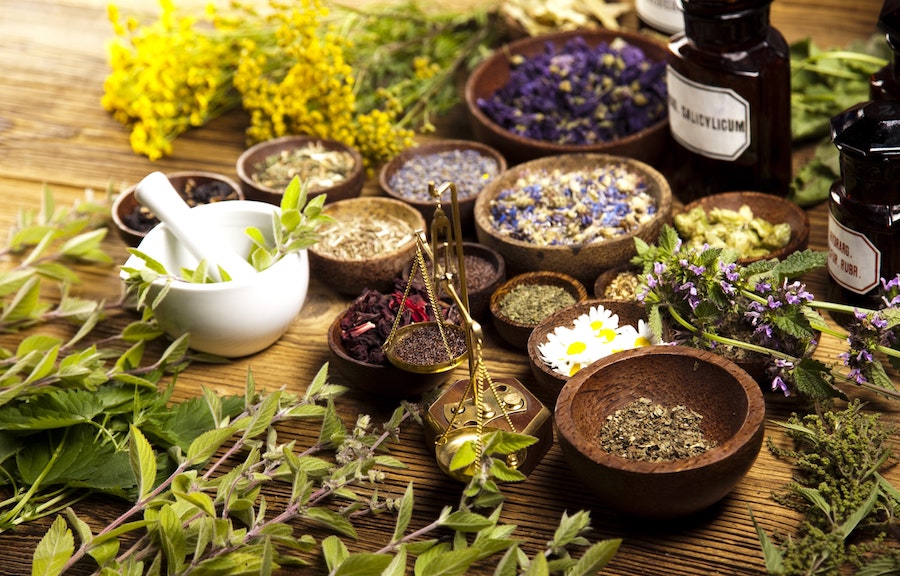10 common herbal remedies and what they can do for your health
Herbal remedies have been the foundation of healthcare throughout history, and many modern drugs are derived from plants.
But while sometimes only prescribed drugs and medical treatments are suitable, the British Herbal Medicine Association (BHMA) points out that even today, herbs can be ideal complements to modern medicines.
It’s estimated that more than a third of Brits regularly use traditional herbal medicines to treat minor ailments, such as coughs and colds, back pain, sleep problems and stress.
Do herbal medicines work?
Some studies have found that certain traditional herbal remedies can have a beneficial effect. Researchers from King’s College London, for example, examined traditional Indian diabetes treatments and cancer treatments used in China and Thailand, and found they had useful properties. In the case of diabetes, extracts from the curry leaf tree were found to have positive effects in helping regulate the release of glucose into the bloodstream.
Another King’s study found ‘promising activity’ against lung cancer cells from certain Eastern plants, particularly the Thai aquatic weed Ammannia baccifera, and the Chinese plant Illicium verum or star anise.

Star anise
Conversely, while ginkgo biloba has been said to enhance memory and help treat dementia, several US studies have found it has no effect. And although garlic is thought to help lower cholesterol, a 2007 Stanford University study found it made no significant difference. Much of the evidence for the effectiveness of herbal medicines is anecdotal, and complementary medicine experts say full – and very expensive – clinical trials need to be carried out to confirm or refute any benefits.
Are herbal medicines safe?
It’s important to remember that just because something’s available without prescription or is ‘natural’, doesn’t automatically make it safe. A recent survey found 58% of respondents believed herbal products were safe because they’re ‘natural’, but some can actually have harmful side-effects.
St John’s Wort, for example, can stop the contraceptive pill from working and also makes the asthma-relieving drug aminophylline less effective, while ginkgo and ginseng are known to interfere with the blood-thinning drug warfarin. So if you’re taking any other medications or have ongoing health problems – or even if you’re just unsure, it’s important to seek advice from your doctor or pharmacist.
And don’t be tempted to self-diagnose and treat symptoms that may need to be investigated. As the BHMA advises: “It is, of course, always wise to check with your health professional if any symptom is severe or lasts for longer than a few days.”
In 2011, a scheme designed to guarantee the quality of herbal medicines in the UK was launched by the government regulator, the Medicine and Healthcare products Regulatory Agency (MHRA). The THR (Traditional Herbal Registration) scheme covers herbal medicines used for a wide range of conditions suitable for self-medication.
Although THR medicines haven’t undergone rigorous clinical trials like synthetic drugs, they’ve been judged by experts to be safe. The manufacturers also have to prove their products have been made to strict standards and contain a consistent and clearly marked dose.
Read our guide on importing unlicensed medicines for individual patients and herbal remedies. http://t.co/Gs8pAZZwmq
— MHRA Herbal Safety (@MHRAherbals) October 1, 2014
“The THR scheme ensures people have access to herbal medicines that are safe and of good quality, and that have information on how to use them correctly,” says the MHRA. “People should only buy over-the-counter herbal medicines that they know have met safety standards… THR products are assessed on the basis of their traditional use as herbal medicinal products and while evidence of safety is required in order to obtain registration, evidence of efficacy is not.”
Consumers can tell if a herbal medicine is registered by looking for the THR number, and usually a logo, on the packaging. THR medicines will also contain clear, officially-approved information on their safe use.
What are different herbal remedies for?
Here, Dr Dick Middleton, a retired pharmacist and now director of the BHMA, outlines – in no particular order – his top 10 medicinal herbs…
1. Rhodiola rosea

Rhodiola
“For relieving stress with an energy boost as well, the herb Rhodiola is difficult to beat,” says Dr Middleton.
2. Pelargonium

Pelargonium flowers
“Take this herbal remedy at the first signs of a cold to keep the symptoms at bay. Always take regularly for at least two days after symptoms have disappeared completely,” he suggests.
3. Devil’s Claw
Dr Middleton says research shows root extracts of this herb have anti-inflammatory, muscle relaxant and pain-relieving properties. “Take for all types of muscle and joint pain,” he suggests.
4. Passion Flower

Passion flower
“This herb relieves stress and anxiety and has a calming effect on mood,” says Dr Middleton, who suggests it’s particularly helpful for relieving insomnia caused by worry and anxiety, when taken in combination with Valerian.
5. Black Cohosh
This well-known herb is said to relieve menopausal symptoms such as hot flushes and night sweats. Middleton says it’s also effective for relieving the mood swings that often accompany the menopause.
6. Valerian
“Valerian root extract has been shown to improve the quality of sleep, but always take it for a few weeks in order to gain maximum benefit,” advises Middleton.
7. Echinacea
This herb has been used for many years to relieve symptoms of colds and flu. Many users also believe it has immune-boosting properties.
8. Milk Thistle
Milk Thistle is widely used to relieve symptoms of overindulgence with food and drink, and Middleton says: “Many users take the herb particularly at Christmas time because it has a longstanding reputation for protecting the liver.”
9. Agnus Castus
Middleton says clinical studies have shown that when taken daily on a regular basis, this herb relieves many premenstrual symptoms such as mood swings, cramps, bloating and breast tenderness.
10. St John’s Wort

St John’s Wort
“This herb is very effective in relieving low mood and anxiety when taken regularly,” says Dr Middleton. However, it can affect the way some medicines work, so always read the leaflet or seek advice before taking, particularly if you’re taking any other medication.
During Herbal Medicine Week (June 16-24) the National Institute of Medical Herbalists, is holding events throughout the UK to raise awareness of the benefits of herbal medicine. For more information, visit nimh.org.uk.
The Press Association
Latest posts by The Press Association (see all)
- Maple Cinnamon Granola - January 8, 2025
- 8 things your feet can tell you about your health - January 8, 2025
- 9 ways to look after your emotional health better in 2025 - January 7, 2025
- EastEnders fans to vote on storyline for the first time in 40th anniversary week - January 7, 2025
- Aldi beats rival Lidl as cheapest supermarket of 2024 - January 6, 2025





















